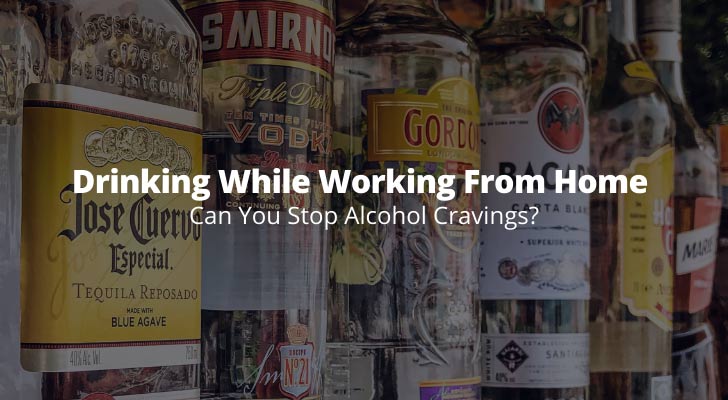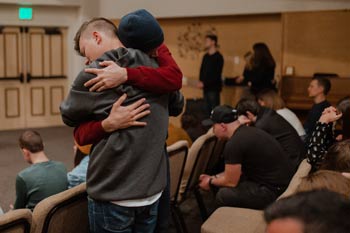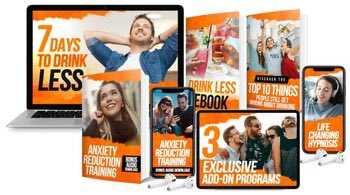The alcohol addiction problem has been highlighted more often than ever as more people choose to work remotely or set up their new online businesses. You really ought to avoid drinking while working from home, but can you stop alcohol cravings when your work-life balance is under your control?
According to a study of 3,000 employees working from home conducted by American Addiction Centers in 2020, 32% of Americans were likely to drink during remote working hours. It’s extremely hard to overcome addiction without the help of others to start with.
Honestly, I don’t know if anyone can beat it without receiving proper help and advice where there’s no working hour restriction. Remembering my own experience - how I used to end up trashing every weekend with alcohol, the only reason I didn’t ruin my life entirely was that I was in full-time employment. I was a professional, I had a mortgage. I had to work, no way around it. I would go to an AA meeting straight after work, and that’s how I overcame my addiction…well, eventually. I couldn’t have got my ass up to go anywhere if I’d been working from home at the time. So if you've started drinking while working from home and cannot seem to stop it, is there a way to stop alcohol cravings?

Drunken Behaviour Is Not The Real Issue
Some advisory sites warn you about your possible intoxicated behaviour during a Zoom meeting - you’ll risk losing your job if you appear drunk on video. Of course you will, and you deserve it for being so out of order. But that’s your behavioural issue, not the underlying problem behind alcoholism.
The bigger problem is when you are so controlled by alcohol that everything in your life revolves around it. You can totally hide your dark habit from others. It’s the alcohol as a depressant and the frequency of your consumption that gradually damage your mental state.
Drinking While Working From Home - How Does It All Start?
Working alone at home means that deciding how to organize your day is completely up to you. No one is watching, and the freedom works better or worse. So there are plenty of factors that could lead to alcohol dependence.
To Make Use Of Flexible Work Style
The most common cause is, because you can. It’s easy to have a glass of alcoholic beverage instead of coffee/tea for every possible reason. Because your kitchen is a few steps away. Because you can get up at any time of day you want. If you fall asleep, you can catch up with work later. Your lunch will taste better with wine. And it’s cheaper than drinking out.
But you may already know what's wrong. Alcohol consumption during working hours will negatively impact your energy and that will drastically affect productivity. It means the reputation of your business will suffer, resulting in decreased sales. As a career, that’s a failure. And a failure can turn you into an alcoholic.
To Relieve Stress
Problem-solving can be emotionally harder when working online from home, you need to deal with a difficult client, for example. You never see them face to face, so communication can often be superficial. Unlike working with colleagues, no immediate support from others is available. Feeling unappreciated and undervalued can demotivate you and lead you to turn to alcohol.
Alcohol can depress your body’s central nervous system, so it may work temporarily, but long term it may contribute to the development of anxiety disorder. As a result, you could fall into a vicious cycle, drinking even more.
To Help Sleep

Stress is not the only cause of difficulty sleeping. When you’re taking on an exciting new project, you’re so self-motivated that you forget when to stop and end up working long hours. As a result, you find yourself one way or the other at night;
- You burn yourself out (i.e. too tired to sleep), or
- Your body’s still releasing adrenaline (i.e. too excited to sleep).
So you may start relying on alcohol to relieve the exhaustion-induced pressure. Alcohol works as a sedative, so it can send you off to sleep better, but it also disrupts your breathing, meaning your body may take less oxygen while sleeping. Sleep quality will suffer, leading to insomnia…
…So they say. Personally, I don’t know about insomnia, but I think that relying on alcohol to help you sleep is a real danger because you’ll quickly get used to the routine. You may find yourself unable to fall asleep without alcohol, and that's really hard.
Potential “Alcohol Use Disorder”
People often use the words “alcoholism/alcoholic” to refer to someone who simply drinks too much, so the solutions they suggest are often;
- "Try to keep the consumption at X units a day"
- "Schedule and monitor the time to drink"
- "Have a dry (detox) day once a week"
- "Get rid of all the bottles in the house", etc.
The thing is, you may have an alcohol use disorder (AUD). It’s a medical term for an “alcoholic”, a brain disorder that stops you from controlling your drinking habits. According to Our World In Data, 107 million people are estimated to suffer from AUD.
It’s really, either you are one of them or not one of them. If you’re not, then sure. Monitor the time to drink, do a detox, whatever. We AUD sufferers cannot do any of that casually. Why? Because we don’t want to. The only solution is to stop drinking completely - for good - and it takes a tremendous amount of willpower, hence help from others to achieve it.
Speak To The “Insiders”
If you are aware of the problem and seriously willing to overcome it, the easiest way is undoubtedly, to start by speaking to the “insiders” - either addiction counsellors or people who’ve been through what you’re going through.
This is not a general knowledge consultation, it’s an addition you’re talking about. So speaking to your friend or your boss/mentor will do little to help, unless they are a recovering alcoholic themselves. If you don’t want to speak to counsellors, the only people who can give you truly useful advice are those who’ve been there, successfully overcome the addiction, and are determined to stay sober.
Local Alcoholic Anonymous

Photo by: Adrianna Geo
Attending Alcoholic Anonymous meetings is one of the greatest ways, but it really depends on the availability in your area. I live in London, UK, where several AA meetings are held every evening, 7 days a week. But the choice will be limited if you live in the countryside.
You may feel apprehensive about attending an AA for the first time and may feel intimidated when entering the room. But remember, the people are there to help you. I was lucky when I first attended my AA meeting; the person at the door was chairing that day, he ushered me in and told me to sit next to him in the kindest possible manner. So no need to worry, but if you still do, you could give them a call in advance and tell them how you feel. You may find their words of welcome comforting, making it easier for you to pay your first visit to AA.
Narcotics Anonymous
If you suffer any drug-related problems, of course, attending a Narcotics Anonymous (NA) is an option. I’ve never been a drug addict myself, so I can’t speak for you. But from what I’ve seen in real life, almost all the NA meeting attendees that I know were referred by their doctors or relevant counsellors. I cannot take this lightly and tell drug sufferers to “just go to NA”, you know what I mean? (If you were a narcotic, you wouldn’t be reading this anyway.)
9 Sober LGBTQ Activists Say About Addiction Treatments
ChoicePoint is based in Fair Lawn, NJ, and provides addiction therapies. I’m honoured to be featured in their article, “9 Sober LGBTQ Activists Share Why You Need To Start The Addiction Treatment”. If you’re drinking while working from home but don’t know where to turn, do visit the site. See what each of us has to say about receiving help and support. I hope our tips will help you stop alcohol cravings.
“7 Days to Drink Less Program” by Georgia Foster
Georgia Foster has been working as a clinical hypnotherapist for over 26 years now, and she’s successfully helped thousands of people reduce their alcohol intake. Her unique method’s been featured on numerous TV shows such as Sky News and The Morning Show, and also in newspapers/magazines including The Telegraph, The Times, Good Housekeeping, and Psychologies Magazine.
The 7-Day Course Content:

Each day, you’ll receive recorded audio advice from Georgia, plus a daily 15-25 minute self-hypnosis recording to help you start drinking less.
- Day 1: Understand your current situation. Learn how to prepare when you start to crave alcohol. Start learning Georgia’s unique way to tell your body, brain, and mind to naturally avoid it.
- Day 2: Georgia will teach you four psychological types of “inner dialogue”; The Inner Critic, The Perfectionist, The Pleaser, and The Inner Child. Plus a questionnaire to discover your drinking habit to help you deal with it.
- Day 3: Reveal ultimate answers to some of the common questions; Why you can’t really quit, why you like some specific alcoholic drinks (e.g. whiskey, wine), and how you can save thousands of dollars from now on.
- Day 4: Discover your surroundings and the influences. About your genetics (family), about how you can socialise when there are plenty of drinking opportunities, and how you can get around them. How you can rewire your brain to create an “alcohol-free day” effortlessly.
- Day 5: Tips on preventing relapse into old drinking habits. Discover the real risk to your body, i.e. liver damage. The truth is, it’s not the alcohol itself that’s damaging it.
- Day 6: Georgia’s unique “mind’s eye” technique to trick your subconscious mind so you won’t be swayed whatever circumstances you are in or whoever you are with.
- Day 7: The round-up. You’ll be reflecting on how you’ve successfully progressed the course and also discovering how your mind has changed.
Why Should You Take This Course?
I can tell you a few good things about this course.
No Time Limit
Despite it being designed to be completed over a seven-day period, there’s no time limit. If you miss a day, you can pick up where you left off the next day. In fact, you can listen to it over & over again. So there’s no pressure. When you’re ready to get serious about reducing your alcohol consumption or even quit completely, you can always go back to it at any time.
The “Hypnosis”
Some people are really apprehensive about receiving a “hypnotherapy”, believing it’s some kind of brainwashing. But your heavy-drinking habit is a result of your obsession in the first place, anyway. Alcohol has already brainwashed you. So it only makes sense that self-hypnosis is the most effective way to quit drinking (or reduce the amount of it.)
In all honesty, it’s hypnotherapy that ultimately helped me quit drinking. So I strongly believe its effectiveness of it.
You Can Do This Alone
As I mentioned earlier, it can take a lot of courage to go out and talk to strangers about your drinking problem, although the counsellors and Alcoholic Anonymous are 100% on your side to help. Georgia Foster’s 7 Days to Drink Less Program can be taken at home, without telling anyone else about it.
Bonuses
You’ll get 3 x free bonuses with this program;
- Bonus 1: Drink Less eBook - The book will help you understand all about your drinking behaviour and tips on how to control it.
- Bonus 2: Anxiety Reduction Hypnosis Training - Alcoholism and anxiety are closely linked, and the stigma is so difficult to get rid of. The hypnosis will help your subconscious mind no longer feel guilty, so you’ll feel comfortable about solving this problem.
- Bonus 3: 1-hour Subliminal Recording - While you can't hear the words, your subconscious mind does. Subliminal recordings are proven to tap into your deep self and help you change your habits.


